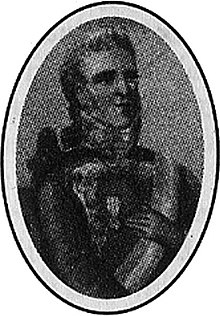Francisco Novella
Pedro Francisco Novella Azabal Pérez y Sicardo , (* 1769 in Madrid , Spain ; † 1822 ) was a Spanish officer who for a short time actually served as viceroy of New Spain.
Life
Francisco Novella came from Spain and pursued a career as an officer in the royal army. In 1821 he served as Brigadier General and Field Marshal of Artillery in New Spain.
The liberal revolution in motherland Spain of 1820 weakened the royalist-absolutist forces in the colony in Mexico; advocates of independent Mexico were boosted and the war of independence flared up again. When Colonel Agustín de Iturbide defected with most of the royalist army to the rebels under Vicente Guerrero in February 1821 , the military and political situation of the Spaniards deteriorated dramatically. Viceroy Juan Ruiz de Apodaca could do little to counter the rebels. He appointed General Pascual Liñán commander in chief of the remaining troops and appointed Novella in June 1821 as military governor of Mexico City.
On July 5, 1821, a politically diverse group of dignitaries and officers under the military leadership of Francisco Buceli forced the viceroy to resign. In his place they made Francisco Novella ruler of the colony. The constitution of 1812, which had come back into force, no longer provided for the office of viceroy - the political leaders of the colonies were given the title of Jefe Politico y Capitán General . The deposed Viceroy Apodaca named Novella in a letter to the Minister of War in November 1821 as the mastermind behind the conspiracy.
Novella must have personally harbored a grudge against Apodaca. The viceroy had converted an old tobacco warehouse in the capital ( La Ciudadela ) into a fortified arsenal. After the loss of rifles and ammunition continued there, Apodaca ordered Brigadier General Novella to stop the theft, which he saw as an order far below his rank and dignity.
After the coup on July 5, the magistrate and provincial officials refused to recognize Novella. Nevertheless, he was sworn in as viceroy by his loyal followers in the viceroy's palace on July 8th. He immediately published proclamations in which he tried to regain political power. At the same time he ordered all men between the ages of sixteen and sixty to take up arms. He compared Iturbide's betrayal to Napoleon's invasion of Spain in 1808.
The effect of his attempts remained limited, as not even the population of the capital obeyed his orders. The insurgents marched ahead and took Puebla on August 3rd . Juan O'Donojú arrived in Veracruz at the end of July ; the liberal Spanish government had sent him as the new political and military leader of New Spain. The royalists at that time only held the capital and forts of Acapulco , Perote and Veracruz - the rest of Mexico was in the hands of the insurgents; the capital was surrounded by 16,000 insurgents. O'Donojú signed the Treaty of Cordoba on August 24 , in which he recognized the independence of Mexico.
Novella consulted with his followers; they finally admitted that the royalist cause was lost for good. He met O'Donojú on September 13th, accepted his legitimation and handed over his (however presumed) competences pro forma to O'Donojú.
He initially retained his military position as the royalist commander of the capital; on September 27, 1821 he opened the gates for the army of the insurgents, who solemnly proclaimed Mexico's independence the following day.
He left Mexico with some of his loyal friends in mid-October and traveled to Cuba. Soon after, he died.
literature
- Fernando Orozco: Gobernantes de México . 3. Edition. Panorama Editorial, Mexico City 2004, ISBN 968-38-0260-5 ( Google Books ).
- Juana Vázquez Gómez: Dictionary of Mexican Rulers, 1325-1997 . Greenwood Publishing Group, Westport CT 1997, ISBN 0-313-30049-6 ( Google Books ).
Web links
- Biography (spanish)
- Biography (spanish)
- Short biography (spanish)
- History of his tenure (Spanish)
- History of his tenure (Spanish)
| predecessor | Office | successor |
|---|---|---|
| Juan Ruiz de Apodaca |
Viceroy of New Spain 1821 |
Juan O'Donojú |
| personal data | |
|---|---|
| SURNAME | Novella, Francisco |
| ALTERNATIVE NAMES | Novella Azabal Pérez y Sicardo, Pedro Francisco (full name) |
| SHORT DESCRIPTION | Viceroy of New Spain |
| DATE OF BIRTH | 1769 |
| PLACE OF BIRTH | Madrid , Spain |
| DATE OF DEATH | 1822 |
